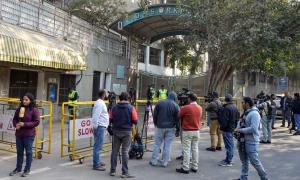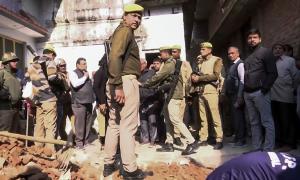"I think there is no doubt that Pakistani territory was used by probably non-State actors. I don't think that there is compelling evidence of involvement of Pakistani officials. But I do think that Pakistan has a responsibility to act. And it doesn't matter that they're non-State actors," US Secretary of State Condoleezza Rice said.
Her comment came against the backdrop of India's claim that Pakistan-based terror group -- Lashkar-e-Tayiba -- was involved in the Mumbai carnage.
"Pakistan needs to act. India and Pakistan need to cooperate. And I do believe that if that is done, they can bring the perpetrators to justice. But they can also prevent a follow-on attack, which has to be a concern," Rice told CNN's Late Edition last night.
In regard to terror outfits using Pakistani soil to carry out terrorist activities, she said, "There were problems with this from Pakistani territory. There are historical problems with Pakistani territory in this regard." Asked about the relationship between the group and the Pakistani government, the intelligence agency or the military services, she said, "there have been historic ties. There is no doubt about that. But Pakistan is a different place now with a civilian government and an army leadership that is working in concert to bring an end to extremism within Pakistan."
"We have to remember that Pakistan itself has been suffering at the hands of extremism. So whatever the history here, and there is a history, the important thing is that Pakistan act against those who used Pakistani soil to perpetrate attacks," Rice said. Asked if Pakistan is doing enough to deal with these terrorists Rice replied, "They are certainly, I believe, committed to doing so. But we are awaiting action, and that action needs to take place soon."
Noting that the US has special concern over Mumbai attacks which also targetted Americans, Rice said, "I did emphasise to the Pakistani government that the United States, of course, has a special interest in the sense Americans were also killed."
"It is very clear that Pakistan's principal problem here is not India. The relationship is improving between Pakistan and India. But there are plenty of people who want to see that relationship blown up. And the Pakistanis and the Indians need to continue or to get back on a course of cooperation."
"In that regard, the Pakistani army is restructuring and does need to be restructured for different tasks. But it's not easy to move from the kind of army that Pakistan has had, to one that is principally counter terrorism and counter insurgency," Rice said.
Reacting to a media article that called for reviewing US relations with Islamabad, Rice said that Washington treated the Pakistani government as an integrated and unified one and said that she had heard nothing in Pakistan that suggested that there were divisions in this regard between the army and the government. Rice said, "This is an elected civilian government. It has the kind of legitimacy that the Pakistani government has not had since 1999. And I believe that it is in actually as strong a position because of that to act. But we have been working with the Pakistanis on this for some time. This didn't start yesterday, it didn't start with the review of helping the Pakistanis to think in a more counter-insurgency, counter-terrorism way."
"But we in the United States have found that it's not easy to restructure your armed forces from forces that are principally aimed at fighting another State actor to forces that can deal with ungoverned regions, safe havens, and not to mention the kind of union of law enforcement and intelligence information that it takes in the war on terrorism," she added.








More from rediff